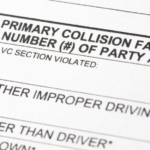Table of contents
- What Is a Recorded Statement and Why Do They Want It?
- Do You Have to Talk to the Other Driver’s Insurance Company?
- Why You Should Think Twice Before Talking
- Ask questions that confuse or trap you
- What If You Already Gave a Statement Without Thinking?
- Do You Have To Give A Recorded Statement To Your Insurance Company
- Tips If You Have To Talk to an Adjuster
- You Don’t Have to Do This Alone
You’re shaken up after the crash. You’re trying to get your car fixed, maybe dealing with pain, doctor visits, or missed work. Then the phone rings. It’s the other driver’s insurance company. They sound calm, maybe even friendly. And then they ask if you’re willing to give a statement.
In that moment, you might wonder if you should say yes? And if you are supposed to? What if you say something wrong?
If that’s where your mind is going, you’re not alone. Let’s walk through what’s really going on, and what you need to know before you say a single word.
What Is a Recorded Statement and Why Do They Want It?
A recorded statement happens when the insurance adjuster, usually from the other driver’s company, asks you questions about the accident and records your answers. This can happen over the phone or in person. It might sound routine. They may even tell you it’s just to help move things along.
But what they don’t say is this: that recording is part of their legal file. And they can, and often will, use it to challenge your version of what happened, downplay your injuries, or shift partial blame onto you.
We’ve seen it firsthand. Someone gives a statement thinking they’re just being cooperative, and weeks later, that same recording gets used to deny their claim or cut their compensation in half.
In Florida, insurance adjusters are trained to listen closely for anything they can use to argue:
- You were distracted,
- You admitted fault (even slightly),
- Your injuries aren’t as bad as you claim,
- Or you waited too long to get medical help.
Even saying something like “I didn’t see the other car” or “I’m not sure how fast I was going” can hurt your case more than you think.
These tactics aren’t rare. In fact, they’re baked into how insurance companies operate. According to data from the Insurance Research Council, over 1 in 3 claimants without legal help receive significantly less compensation than those who have an attorney, often because of early statements that hurt them later.
So before you say anything, even if you’re just trying to be helpful, ask yourself: Is this really in my best interest, or theirs? Because once you speak, you can’t take those words back. And the key is you are not obligated to speak with them.
Do You Have to Talk to the Other Driver’s Insurance Company?
In Florida, you’re not required to give a recorded statement to the other driver’s insurance company. But many adjusters won’t tell you that, and they’ll use anything you say to protect their payout, not your recovery.
You’re not legally obligated to answer their calls, respond to their questions, or give any kind of statement. If you’re not filing a claim with them, you don’t owe them a thing, not even a call back.
But here’s where things can get complicated. If you’re asking the other driver’s insurance to pay, for example, to avoid using your own coverage or paying a deductible, they’ll likely request your version of what happened. That usually means a recorded statement before they’ll agree to process your claim.
Can you say no? Yes. But they might delay things or deny your claim altogether if they think you’re not cooperating. And when you’re already dealing with car repairs, medical bills, or missed work, delays only make things harder.
Some adjusters will keep calling, even after you’ve told them no. They may leave repeated voicemails or try to pressure you into talking “just to confirm a few details.” You don’t have to give in. You can block the number, or simply tell them: “I’m working with a lawyer. Please direct all communication to them.” Once we’re involved, they’re not allowed to contact you directly again.
So what should you do? Don’t go into this alone. Call a lawyer before you say a word. Let someone who knows the tactics protect your rights and handle the conversation for you.
And keep this in mind: Florida uses a “comparative fault” rule. That means if they can pin even a small part of the blame on you, they may reduce what they owe. All it takes is one wrong word in a recorded statement to give them that opening.
By preparing properly, you’re not being difficult; you’re protecting your claim. Because this isn’t just a conversation. It’s a legal move that could shape the outcome of your case. Let’s look at what makes recorded statements so risky.
Why You Should Think Twice Before Talking
It might feel harmless to explain what happened. You’re being honest, just telling your side, right? That’s exactly what the insurance adjuster wants you to think.
But their job isn’t to help you; instead, to protect their company’s money. They’re trained to ask questions in ways that make you sound unsure, careless, or partly responsible. That can seriously impact how much they offer you or whether they pay at all. Here’s what they’re looking for:
Twist your words to make it look like you share the blame
They don’t need you to say, “It was my fault.” They just need one small phrase, like “I might’ve been going a little fast,” to start building a case that you were at least partly responsible. As we’ve mentioned, in Florida, even that matters. If they can pin even 20% of the blame on you, that’s 20% less they might have to pay.
Ask questions that confuse or trap you
The adjusters might ask things like: “Were you 100% sure the light was green?” That kind of question sounds simple, but it’s meant to create doubt. Say the wrong thing, and suddenly your credibility is in question.
Use your words to delay or deny your claim
If you say something that doesn’t exactly line up with the police report or their own driver’s version, they can flag your claim for “further investigation.” That means delays. And the longer they wait, the more desperate you might get, especially if you need your car fixed or bills paid. They’re betting you’ll settle faster for less just to move on.
Push for accidental admissions
Saying something casual like “I didn’t even see the other car” can be turned against you. Adjusters might argue you weren’t paying attention or weren’t driving defensively. One sentence, spoken in stress or confusion, can be used as leverage against your entire claim. It’s how these companies operate.
You’re not being difficult by protecting yourself—you’re doing what’s necessary to protect your case. But what if that call already happened? What if you gave a statement without thinking it through, and what can you do now?
What If You Already Gave a Statement Without Thinking?
First, you’re not the only one. It’s a common reaction, especially when you’re stressed, injured, or just trying to move things along. The good news? If you’ve already talked to them, your case isn’t ruined yet. You still have options. But it’s important to act quickly. Here’s what you need to know and do now:
Don’t give a second statement
You might get another call asking you to “clarify” or “follow up” on something you said earlier. Don’t do it without legal help. Anything new you say could be used to pick apart your first statement or create more doubt.
Don’t sign anything
They may send you documents that look routine, such as release forms, waivers, settlement offers. Don’t sign. Even a simple signature can limit your rights or close your case completely, often for far less than you deserve.
Talk to a lawyer now
The sooner you bring in legal help, the better. An attorney can step in and take over communication so you don’t have to deal with pressure, trick questions, or missed details that could hurt your claim. They should request copies of any statement you gave to review it and prepare a strategy to protect your case.
Make sure the recorded statement matches the rest of the evidence
If there’s a police report, dash cam footage, traffic camera video, or witness statement, we get it. That way, even if something in your recorded statement wasn’t perfect, we can back your story with hard facts and fix what needs correcting.
You could still recover full compensation
One imperfect phone call doesn’t automatically ruin your claim. But waiting too long or making another mistake could. That’s why you need to move fast to take control of the situation before the insurance company does.
No matter when the accident happened or what’s already been said, it’s not too late to protect your case. And if you’re dealing with your own insurance company now, there are a few things you should know before giving them a statement.
Do You Have To Give A Recorded Statement To Your Insurance Company
If you’re going through your own insurance company, whether it’s for property damage, medical bills, or both, you do have an obligation to cooperate. That’s part of what you agreed to when you bought the policy. And in most cases, that means giving a statement. But cooperating doesn’t mean going in blind.
Your own insurer might seem more trustworthy than the other side’s. But once a claim is open, they’re also looking at their bottom line. That means they may look for ways to reduce the payout, question your injuries, or argue that certain costs aren’t covered. It happens more than you’d think.
Sometimes, victims who have strong personal injury protection (PIP) coverage still need fto ight their own insurer for basic reimbursements like ER visits or follow-up care. One wrong answer in a statement can lead them to say, “We don’t think that treatment was related to the accident,” or “You waited too long to get checked out.”
Even though you’re “on the same team,” they’ll record what you say, put it in the claim file, and refer to it if you need additional care down the line. That’s why we recommend having an attorney either help you prepare or be on the call with you. In such a way, you can make sure you answer accurately without opening the door to misinterpretation or claim delays.
Avoid guessing, giving estimates, or playing down your injuries. If you’re unsure about something, say that. You don’t have to have every answer ready, and it’s okay to follow up later with more detail.
You’re expected to cooperate with your insurer, but that doesn’t mean doing it blindly. Having someone on your side who understands how these conversations work can make all the difference.
If you’re in a position where you have to speak with an adjuster now, here are a few tips on how to protect yourself.
Tips If You Have To Talk to an Adjuster
Sometimes, avoiding the other driver’s insurance company isn’t an option, especially if you’re filing a third-party claim and need them to cover the damage or medical bills. If you’re put in that position, protect yourself by knowing what to say and what not to.
- Ask if the call is being recorded
Before anything else, ask directly: “Is this being recorded?”
If it is, stop there. Tell them you need to speak to a lawyer first. In many cases, once they know you’re being cautious, they’ll give you space or shift the pressure somewhere else. - Stick to facts only
What lane were you in? What did the traffic light show? Where was your car hit? That’s it. Keep your answers short and clear. Avoid words like “I think,” “I believe,” or “Maybe.” Adjusters love to pick apart uncertainty. Control what you say all the time. - Don’t admit fault, even a little
You might feel pressure to be polite or agreeable. Don’t say things like “I guess I should’ve braked earlier” or “I might’ve been going fast.” These comments get twisted fast. In Florida, even small admissions can reduce your compensation because of comparative fault laws. - Stay away from injury details
Your pain might be worse tomorrow than it is today. Don’t lock yourself into saying “I feel fine” or “It’s not that bad” on a recorded call. It can come back to bite you if you need extended treatment or a specialist later. - Never guess
If they ask how far away the other car was, how fast you were going, or how long the light was green, don’t try to estimate. Just say, “I’m not sure.” It’s always safer to be honest about what you don’t know than to give an answer they’ll hold against you. - Offer a written statement instead
If they insist on getting your version, tell them you’d prefer to submit a written statement after you’ve had a chance to go over it. This gives you time to carefully explain what happened and run it by a lawyer before it’s used as evidence.
In a perfect world, you wouldn’t have to talk to the other driver’s insurance at all. But if you do, don’t go into that conversation unprepared. One mistake can cost you real money. Let us help guide you through it—so you don’t end up paying for someone else’s accident.
You Don’t Have to Do This Alone
A single phone call with the wrong insurance adjuster can change everything. We’ve seen people lose thousands in compensation over one quick statement they gave without realizing how much was at stake.
Insurance companies deal with claims every day. They know how to ask the right questions to protect their payout. But you’re dealing with pain, stress, and uncertainty—not legal scripts. You shouldn’t be expected to handle all that on your own. That’s where we come in.
Our car accident attorneys will deal with the pressure, the paperwork, and the back-and-forth with adjusters, so you can focus on your recovery. You don’t pay us anything unless we win for you, and you’ll never have to face the insurance company alone.
You take care of healing. We’ll take care of everything else.
Call us before you say anything. Or visit us at one of our offices our Florida offices — in West Palm Beach, Miami, Fort Lauderdale, Tampa, Fort Myers, Orlando, Port St. Lucie, and more. Whether it’s your insurer or theirs, we’ll make sure the facts are clear, your words aren’t twisted, and you’re not being pushed into something that could hurt your case down the road.





